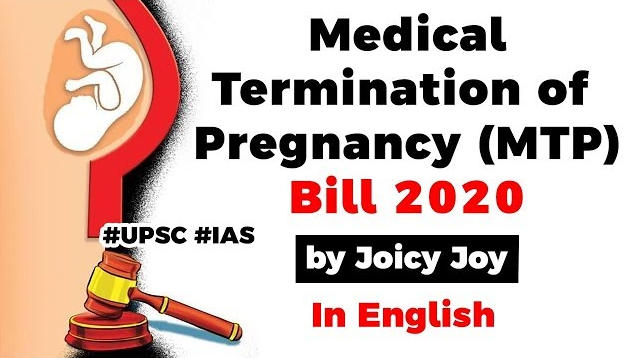Table of Contents
CURRENT AFFAIR
- The Union Cabinet has approved changes to the Medical Termination of Pregnancy (MTP) Act, 1971 in order to increase the upper limit for termination of a pregnancy from 20 weeks to 24 weeks.
The Medical Termination of Pregnancy (MTP) Act, 1971
- The Medical Termination of Pregnancy (MTP) Act, 1971 provides for termination of pregnancy only up to 20 weeks.
- If an unwanted pregnancy has proceeded beyond 20 weeks, women have to approach a medical board and Courts to seek permission for termination, which is extremely difficult and cumbersome process.
Section 3 (2) of the MTP Act, 1971
- According to Section 3 (2) of the MTP Act, 1971 a pregnancy may be terminated by a registered medical practitioner-
- Where the length of the pregnancy does not exceed twelve weeks, or
- Where the length of the pregnancy exceeds twelve weeks but does not exceed twenty weeks.
- In this case, the abortion will take place, if not less than two registered medical practitioners are of opinion, that the continuance of the pregnancy would involve a risk to the life of the pregnant woman (her physical or mental health); or there is a substantial risk that if the child were born, it would suffer from some physical or mental abnormalities to be seriously
Issue
- The law does not accommodate non-medical concerns over the economic costs of raising a child, effects on career decisions, or any other personal considerations.
- The law says, for minors- written consent from guardian is required, and
- The unmarried women cannot cite contraceptive failure as a reason for abortion.
- A woman’s right to decide for herself, did not and still does not fall within the intent or ambit of the MTP Act.
- When it comes to foetal abnormalities and pregnancies resulting from rape, this limit of 20 weeks is proving to be a hurdle for both the woman and the
- Women seeking an abortion after the legal gestation limit often have no option but to appeal to the courts for permission to terminate the pregnancy.
Provisions of Proposed Bill
- Requirement of opinion of one registered medical practitioner (instead of two or more) for termination of pregnancy up to 20 weeks of gestation.
- Requirement of opinion of two registered medical practitioners for termination of pregnancy of 20 to 24
- Increase the upper gestation limit (for abortion) from 20 to 24 weeks for survivors of rape, victims of incest (human sexual activity between family members or close relatives) and other vulnerable women, including minor girls.
- For unmarried women, the Bill seeks to relax the contraceptive-failure condition. Earlier “only married woman or her husband” were allowed to medically terminate the pregnancy, but the Bill proposes the same for “any woman or her partner”.
STATUS OF ABORTION IN INDIA
- The Lancet Research shows that half of the pregnancies in India are unintended and that a third result in abortion.
- Only 22% of abortions are done through public or private health facilities.
- Lack of access to safe abortion clinics, particularly public hospitals, and stigma and attitudes towards women, especially young, unmarried women seeking abortion, contribute to this.
- Doctors refuse to perform abortions on young women or demand that they get consent from their parents or spouses despite no such requirement by law. This forces many women to turn to clandestine and often unsafe abortions.
- According to UNICEF India and World Bank data, India counts among the highest number of maternal deaths worldwide. India witnesses 45,000 maternal deaths every year, coming to an average of one maternal death every 12 minutes.
- Unsafe abortions are the third leading cause of maternal deaths in India. Researches have shown that half the pregnancies in India are unintended and about a third result in abortion. Only 22% of abortions are done through public or private health facilities.
Conclusion
- The Bill if passed will provide greater reproductive rights to women as abortion is considered an important aspect of the reproductive health of women.
- Deaths and injuries from unsafe abortions are largely preventable, provided services are performed legally by trained practitioners.
Latest Burning Issues | Free PDF






















 WhatsApp
WhatsApp